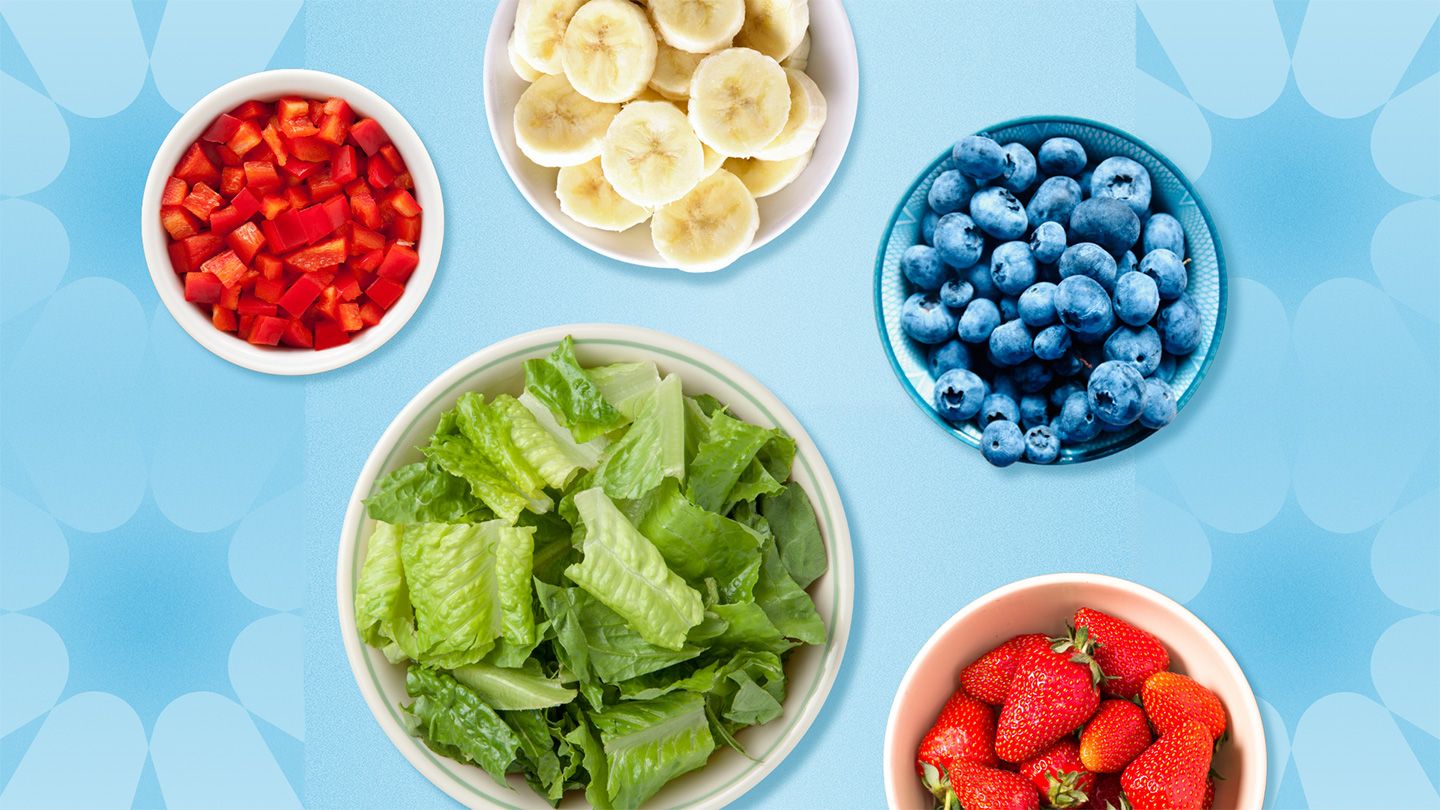Growing up, your mom probably told you to eat your fruits and veggies so you’d grow up to be big and strong. Now, a small study suggests another good reason to fuel up with produce: These nutrient-packed foods could help you snooze more soundly.
The observational research, which was published in Sleep Health, found that eating 5 cups of fruits and vegetables each day could result in longer, more uninterrupted sleep that same night, with fewer instances of waking up.
The findings show that better sleep doesn’t have to be complicated, says study coauthor Marie-Pierre St-Onge, PhD, a professor of nutritional medicine at the Columbia University Irving Medical Center in New York. “We can get better sleep with very simple things — with food.”
People Who Ate More Produce Slept More Soundly Through the Night
To tease out the effects of diet on sleep quality, researchers recruited 34 adults ages 20 to 49. About 4 in 5 participants were male, and all reported regularly sleeping seven to nine hours per night and eating three meals a day.
The participants contributed 201 days and nights of paired diet and sleep data, collected during their normal day-to-day routines. Each wore an activity monitor on the wrist to track sleep metrics and used an app to log everything they ate and drank for each 24-hour period.
The researchers then performed a nutrient analysis to see how participants’ daily diets affected their nighttime sleep.
They analyzed the effects of multiple variables, including:
- Macronutrients: Carbohydrates (including fiber), protein, and fat
- Micronutrients: Vitamins and minerals, including magnesium, B6, vitamin D, calcium, sodium, and zinc
- Food groups: Meat, dairy, fruits and vegetables, nuts, and grains
The results showed that on days when participants ate more fruits, vegetables, and carbohydrates, they were more likely to get better sleep, which the study defined as having fewer instances of waking up during the night.
But not all carbs are equal when it comes to promoting sleep, says Dr. St-Onge. Simple carbohydrates like added sugars or the kind in white bread, for instance, will not help your sleep. “It’s the [complex] carbohydrates that also provide fiber and magnesium that are more helpful for sleep,” she says.
On the other end of the spectrum, on days when participants ate more red meat and processed meat, they had a higher likelihood of waking up multiple times in the night.
Sudha Tallavajhula, MD, a sleep neurologist with UTHealth Houston Neurosciences in Texas, who wasn’t involved in the study, says that the findings align with previous research showing that complex carbohydrates from fruits and vegetables help people fall asleep and stay asleep because they help the body absorb tryptophan.
The body uses this amino acid to make important neurochemicals, including melatonin, a hormone that tells the body it’s time to go to sleep. (Turkey, the beloved Thanksgiving staple, is rich in tryptophan, which explains why it sends many of us off to an afternoon nap.)
Fruits and Vegetables Provide Sleep-Inducing Fiber
Previous studies have found that a higher intake of fiber (a nondigestible carbohydrate that cannot be broken down into sugar) is connected to better sleep. A 2016 study, also coauthored by St-Onge, for instance, found that eating more fiber was tied to getting more slow-wave sleep, a deep, restorative stage of sleep that doesn’t involve dreaming.
Fruits and vegetables have large amounts of fiber, making them excellent choices for upping your sleep game.
One cup of raspberries, for example, has 8 grams of fiber. A single medium apple has 4.5 grams. The highest fiber-rich vegetables are green peas, broccoli, turnip greens, and Brussels sprouts.
The U.S. Department of Agriculture recommends 25 grams of fiber daily for women and 38 grams for men. Surveys suggest, though, that the average American adult gets only 16 grams of fiber per day.
Fruits and Veggies Also Have Good Amounts of Magnesium, Which Aids Sleep
St-Onge and her team found that magnesium was also tied to better sleep quality. “And where do we get magnesium?” St-Onge asks. “We get it from green leafy vegetables. We get it from complex carbohydrates, whole grains, and nuts and seeds,” she says.
Magnesium is an essential mineral well-known to promote sleep. “Magnesium stimulates the release of signals in the brain to relax and calm the body, and is also involved in the production of melatonin,” explains St-Onge.
Fruits and vegetables — you guessed it — are often rich in magnesium.
Tips on Incorporating More Fruits and Veggies Into Your Diet
Dr. Tallavajhula says that since the study was small (only 34 participants) and mostly involved men, it’s difficult to apply the results to everyone.
“But it’s an intriguing step in the direction of dietary advice,” she says.
Sharon Collison, RD, a clinical faculty member at the University of Delaware who specializes in medical nutrition therapy, says that the new study echoes what she sees in her practice: “I find that people who have erratic sleep patterns often have erratic food intake patterns. So improving one often helps the other one,” says Collison, who wasn’t involved in the study.
To get more fruits and vegetables into your daily diet, she recommends filling half of your plate or bowl with fruits and vegetables. Then fill another quarter with fiber-rich whole grains, such as oatmeal, whole-wheat bread, or brown rice.
If that feels like a dramatic increase for you, Collison says to get in the habit of eating a piece of fruit on your way home from work. This can also help reduce hunger when you are finally home — a time when many people struggle with snacking.
“I tell my patients that every meal and every snack needs to have a fruit and vegetable with it,” says Collison.
St-Onge adds that healthy eating should feel easy — and it shouldn’t break the bank either. You don’t have to buy everything fresh. “Even frozen is better than nothing at all,” she says.
Read the full article here




